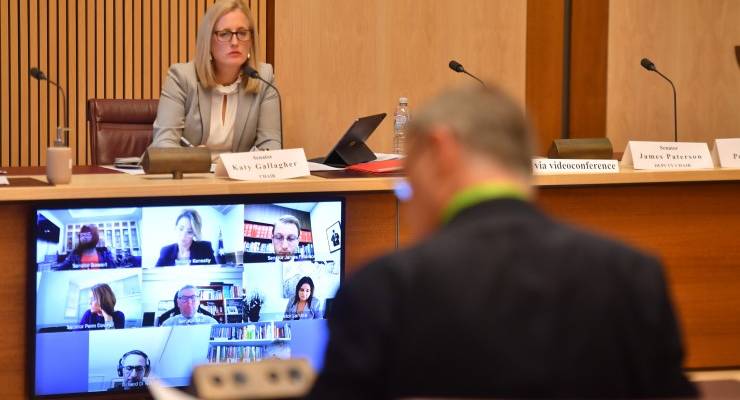
Well, Crikey called it. We warned the national cabinet was a bad idea because its rules, processes and information are shrouded in secrecy.
In its second interim report, the select committee on COVID-19 has slammed the Morrison government and the national cabinet for not providing crucial information about the pandemic and hindering the committee’s ability to do what it’s supposed to do: scrutinise the government’s response to the pandemic.
Wartime concept
This is the second time in history the national cabinet has formed, made up of state and territory premiers and chief ministers. The first time was during World War II, although then it consisted only of federal MPs.
The cabinet was formed to cut past the sluggish, bureaucratic process of the Council of Australian Governments (COAG). But it serves another purpose: to keep things secret from the public.
Cabinets have a different set of rules and provisions. Documents — anything brought to the cabinet, even if prepared by another minister or department, remain the property of the government and are supposed to remain secret for 20 to 30 years.
What information is missing?
There are seven members of the select committee — including chair Labor Senator Katy Gallagher and deputy chair Liberal Senator James Paterson — and senators from Labor, the Greens, the Nationals and independent Jacqui Lambie.
The interim report focuses on public interest immunity claims — national cabinet argues the information should stay secret but the committee says that has “compromised the committee’s ability to scrutinise government decisions with a profound impact on lives of Australians”.
“The committee is concerned that they reflect a pattern of conduct in which the government has wilfully obstructed access to information that is crucial for the committee’s inquiry,” it said.
The committee wants access to government legal advice about the COVIDSafe app, information about whether health data modelling about scenarios for coronavirus infections were provided to the cabinet, dates of particular government decisions and deliberations — including its response to protecting those in aged care — and advice given to national cabinet by the Productivity Commission and on the reintroduction of the liquid assets test for certain Centrelink payments.
Perhaps unsurprisingly, Liberal committee member Senator James Paterson lauded the government’s “significant cooperation with the Senate inquiry”.
We can’t rely on FOI
While freedom of information (FOI) applications can be lodged for some cabinet documents, cabinet records and notebooks are exempt. The Prime Minister’s Office met FOI deadlines in just 7.5% of cases in the 2019-20 financial year.
Greens Senator Larissa Waters has accused the Morrison government of responding to FOI requests with “answers that are so massaged and workshopped that they are meaningless”.








both major parties are addicted to obsessive secrecy when in government, aided by a constitution handed down from Westminster long ago, and never really revised for the Australia we have become (and would like to become) No innate rights, no vision…just jobs and perks for the lucky few.
The irony is that the national cabinet seems to be one of the reasons behind Smirko’s popularity.
We all have a duty to self inform by any means the dangers that may be waiting from a jab by an untested & rushed out Vaccine. Because for the first time in World history this Vaccine uses mRNA technology which has never been tested before on Humans. We are the human experiment. I’m not anti Vaxx -I’m anti -mandatory Vaxx.
This current Vaccination may not show problems until some time in the future when you meet up with a wild virus. This may cause an autoinflammatory response that the body is unable to deal with.
In the socioeconomic rush towards mass vaccination without longer-term safety testing, it would seem that an essential stage in any vaccine licensing process should involve careful analysis of the human proteome against vaccine peptide sequences. This should minimize the risks both of acute autoimmune reactions to inoculation and future chronic autoimmune pathology.
More worrying is World wide Governments have given Companies like Pfizer and Moderna total immunity from legal liability if something unintentionally goes wrong with their Covid vaccines.
So, do you have any examples of adverse reactions, other than those that have been reported widely?
And if you’re against a mandatory vaccination, why aren’t you quite content about the fact that it is already NOT mandatory?
And the Astra Zeneca vax is not an mRNA vax, so do you have a problem with that?